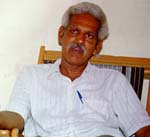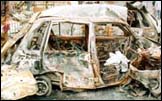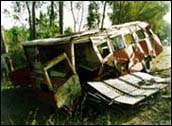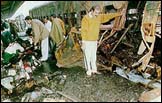The Rediff Interview/Dr Vara Vara Rao
'Parliamentary politics is not suitable for a country like
India'
 Despite the authorities's efforts to contain it, the Naxalite movement
is on the rise in several states. And ahead
of all such is the Telugu Desam-ruled Andhra Pradesh, where the late chief
minister Nara Taraka Rama Rao raised the slogan 'Naxalites are patriots.'
Despite the authorities's efforts to contain it, the Naxalite movement
is on the rise in several states. And ahead
of all such is the Telugu Desam-ruled Andhra Pradesh, where the late chief
minister Nara Taraka Rama Rao raised the slogan 'Naxalites are patriots.'
NTR's soft corner for the Marxist-Leninist rebels helped the spread
of their movement in the state, especially in Telangana. Today, a war-like situation
prevails in the state,
with the revolutionary People's War Group and the state
police locked in bloody combat, making Chief Minister Nara Chandrababu Naidu think of reimposing the ban on PWG.
Thirty years after the Naxalbari uprising in West Bengal's Siligiri district on May 23, 1967,
Naxal writer and PWG leader Dr Vara Vara Rao -- or VV, as he is known in extremist circles -- speaks his mind about the movement and its future to Sandesh Prabhudesai.
The 56-year-old editor of Srijana (a literary magazine), who founded
the Viplav Rachayital Sangham (Revolutionary Writers Association) in 1970, has seven anthologies of Telugu poetry to his credit. An impressive orator, he spent over six years in jail for revolutionary writings and speeches, and has over 20 cases against him since 1973.
Three decades after it started, the Naxalbari movement seems to have lost its fire.
It is limited to just
West Bengal, Andhra Pradesh, Bihar,
Karnataka, Maharashtra and parts of Tamil Nadu.
 That's not true. It is a fact that the movement came to a standstill by 1971. Naxalbari
laid down a path of rejecting parliamentary politics, taking up agrarian armed revolution,
and forming the Communist Party of India (Marxist-Leninist).
That's not true. It is a fact that the movement came to a standstill by 1971. Naxalbari
laid down a path of rejecting parliamentary politics, taking up agrarian armed revolution,
and forming the Communist Party of India (Marxist-Leninist).
But because of Parliamentarism
and trade unionism, the party took a wrong decision -- it adopted armed struggle
as the only path
of revolution. That's why there was a setback.
Taking lessons from this, the ML movement then adopted
a mass line. In AP, the Revolutionary Writers Association was
formed in 1970, while the Jana Natya Mandali was founded two years
later. The Radical Students Union was formed in 1974, and was followed by the Radical
Youth League in 1977. The students and youth, along
with the JNM, took up 'Go to Village' campaigns and formed Raytu
Coolie Sanghams (peasant organisations).
This led to mass upsurges in several parts
of West Bengal, Bihar, Tamil Nadu, Karnataka, Haryana, Delhi. The whole tribal belt of Dandkaranya, which include
parts of AP, Maharashtra, Madhya Pradesh and Orissa was seized by it.
Compared
to the '190s, today's position is very strong. In fact, in north Telangana
and Dandkarnya, it has reached an advanced stage of forming guerrilla
zones. We visualise Dandkaranya as a base area for forming a people's army, with
platoons of 200 red
guards each. In such a situation, how can you say the fire is dying out? It's advancing
on a strong footing.
You claim the movement has grown because of educated
people and intellectuals. But the majority of such people today
reject your movement, calling it mere militancy.
I don't claim all the educated people accept
our movement. In fact, the press is giving a wrong picture of it, wherever
the movement does not exist. But where it is strong, the whole socio-political scenario depends
fully on Naxalite politics.
True, there are educated people who do not join the movement -- that might be
because of their bourgeois mentality. But the middle class and the intellectuals at
large approve the Naxalite
line. Today, they are witnessing corrupt parliamentary practices,
degenerated politics and
scams all over and they say ours is the right path.
Now, even people who
left the movement following the severe repression
of the 1970s admit this is the only hope for our country.
In West Bengal, they are slowly shading out their cynicism and welcoming the PWG.
You talk about uniting the oppressed masses all
over the country. But your movement itself has split into
many groups in the last 30 years, despite the common language of new democratic revolution. Isn't that a failure of the movement?
You are talking about the situation in 1972, when
the CPI-ML was split into various groups. But the efforts of
reunification which started during the Emergency gained momentum
after the Jagityala struggle in AP's Karimnagar district. The number
of ML groups has substantially reduced in the last 20 years.
But you are still a divided force.
There is a difference. The ML parties which owe
allegiance to Naxalbari are coming together.
The concrete example is that of the PWG, CPI-ML Party Unity
and the Maoist Coordination Centre forces. They are now taking up joint programmes.
ML groups which practice parliamentarism
claiming to expose it by being part of it are also coming
together.
Why don't you take them into your fold?
It's not true what they claim. Their experiment was
a total failure. On the contrary, we achieve more by our
boycott election slogans. You can't expose parliamentarism by becoming
part of it.
What about the allegation the PWG plays a double game? That, even while you call for boycotting elections, you support one or the other party?
Why should we do it? If we wish, the PWG can also take a parliamentary
line.
In today's politics of unprincipled alliances and scams, many people see the Left parties like the CPI and the CPI-M as
sincere ones. Why?
 I don't know why you get the impression that the CPI and the CPI-M are sincere.
Tomorrow, if the Jyoti Basu-led CPI-M government falls in West Bengal,
I am certain Basu's scams will be made public. And in four
or five years, you will also hear about CPI involvement in scams.
I don't know why you get the impression that the CPI and the CPI-M are sincere.
Tomorrow, if the Jyoti Basu-led CPI-M government falls in West Bengal,
I am certain Basu's scams will be made public. And in four
or five years, you will also hear about CPI involvement in scams.
In AP, the CPI-M is strongly supporting the Telugu Desam government which is involved in many scandals and corrupt practices. The
TDP government has withdrawn subsidies and has lifted prohibition
on liquor. The CPI-M, which was always opposing the withdrawal of prohibition,
could not withdraw support to the TDP government. It's just a tail
of the TDP than a sincere Left party.
Which rule do you prefer at the Centre -- the Congress rule all these
years or the new coalition of anti-Congress parties?
The question of preference does not arise at all -- we reject
the parliamentary path. But let me make a point. How can you say that the
UF is anti-Congress when they
are fully dependent on the Congress? The Constitution
states the government would be in power at the will of the
President. But the present government is surviving at
the will of the Congress president. Because Sitaram Kesri
wanted H D Deve Gowda to step down, he had to.
Do you think liberalisation and globalisation
has changed the face of India? If so, in what way?
Yes, it has. The invasion of imperialism has definitely increased since 1991
due to the new policy. We have realised that we should give
equal weight to the anti-imperialist struggles, at par with our
anti-feudal struggles.
But which is a major threat -- imperialism
or feudalism?
The invasion of MNCs does not change the principal character of
feudalism in India. In fact, imperialism is in perfect harmony with feudalism.
It encourages feudal practices and feudal values.
You can practically feel it in the cultural field, especially
with the satellite television channels. What does this advanced
technology preach to us? The reactionary philosophy on one hand,
and the degenerated Western culture on the other.
Imperialism wants to keep
the feudal values and backwardness in the Third World intact,
so that it can exploit the cheap labour and resources available there. Imperialism is coming
through feudalism and it is inseparable
today.
But films, serials and documentaries are being released on Naxalites too.
Yes, but those are not in support of Naxalism. The impact of our movement
is so much in AP today that even Naxalites have become a saleable
commodity on the box office. The films are all bundles of contradiction.
The Naxalite is shown a hero and a saviour while all politicians
are shown corrupt. But there would be one police officer who is
very sincere. There is no element of class struggle in it;
only glorification of the Naxalite movement. Of course, it helps
as an outlet, especially to the people of Telangana, where even
standing in a group is suspected as a Naxalite activity.
How do you view the recent attempt on Gaddar's life? The police suspects
the PWG.
Nonsense. Gaddar has been with the PWG for the last 30 years except
for seven months when he was under suspension due to
problems arising out of a communication gap. The state
government got irritated when Gaddar's suspension was revoked.
Another reason is the movement started by the civil
liberties groups, writers and other intellectuals, to claim the dead bodies of naxals and demand
re-postmortems. Gaddar was in its forefront.
Funeral processions can't be banned, and these were used for public
meetings with speeches, songs and slogans.
In such a situation, they targeted Gaddar. Initially,
they tried to implicate him in false cases. But as Gaddar refused to
take bail, the police had to release him following state-wide
protests. On April 1, two busloads of police surrounded
his house, but he was not there. On April 6,
they entered his house in civilian clothes and tried to kill him.
But the PWG also resorts to killing innocent people and policemen. Is it necessary to kill to fulfill
your dreams of revolution?
No revolutionary party will kill an innocent person. It's all
false propaganda. In fact, even killing the class enemy, the landlord is not done today.
But the problem comes when there is an informer. The party has
to decide between the life of a revolutionary and the life
of the informer. Suppose this informer is a poor man or a dalit,
then the press immediately depicts him as the innocent villager.
How do you view the future of India?
 Jawaharlal
Nehru served the big industrialists and landlord class. But he was not corrupt. He ruled
for 17 years, while Indira Gandhi remained in power for 11.
But even after coming to power with over 400 seats, Rajiv Gandhi
could stay only for five years. P V Narasimha Rao had a
lot of difficulty keeping his full term. Now we see
every prime minister or chief minister celebrating 100 days, six
months, one year. Practically every minister is either directly or indirectly involved in scams. Tomorrow we'll hear a former prime minister
is in jail for corrupt practices. It very clearly means that
parliamentary politics is not suitable for a country like
India.
Jawaharlal
Nehru served the big industrialists and landlord class. But he was not corrupt. He ruled
for 17 years, while Indira Gandhi remained in power for 11.
But even after coming to power with over 400 seats, Rajiv Gandhi
could stay only for five years. P V Narasimha Rao had a
lot of difficulty keeping his full term. Now we see
every prime minister or chief minister celebrating 100 days, six
months, one year. Practically every minister is either directly or indirectly involved in scams. Tomorrow we'll hear a former prime minister
is in jail for corrupt practices. It very clearly means that
parliamentary politics is not suitable for a country like
India.
Are you saying that a whole system should be discarded because of the current situation?
No, not because of the current situation. We have been saying for the last
30 years that parliamentary system does not suit an agrarian society
in principle. It is a consequence of certain
dialectical development. Capitalism came into England and France
by demolishing the whole feudal system existing there and bringing
industrial revolution.
In an agrarian society like India, we did not pass through
these dialectical developments. Since 1857, colonialism has learnt
to live with feudalism. They are happy bedfellows now. So you can't
expect capitalist developments here in the true sense. Hence, the parliamentary
system does not suit our country. The only solution to it is to
follow the path of Naxalbari and free ourselves from these semi-faced,
semi-colonial forces, paving way to a real democracy. You can't
fight it without taking arms in your hands.
Varavara Rao's photograph: Sandesh Prabhudesai. PWG violence photographs: P Anil Kumar
Tell us what you think of this interview
|



